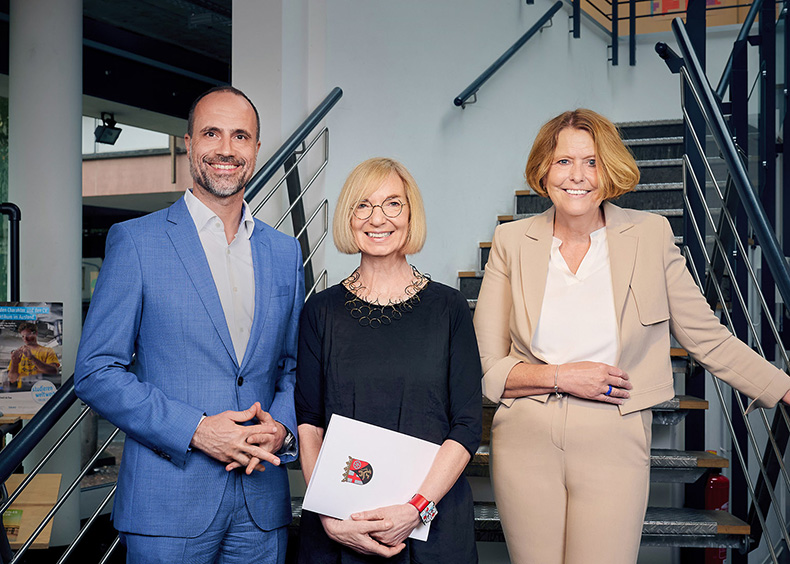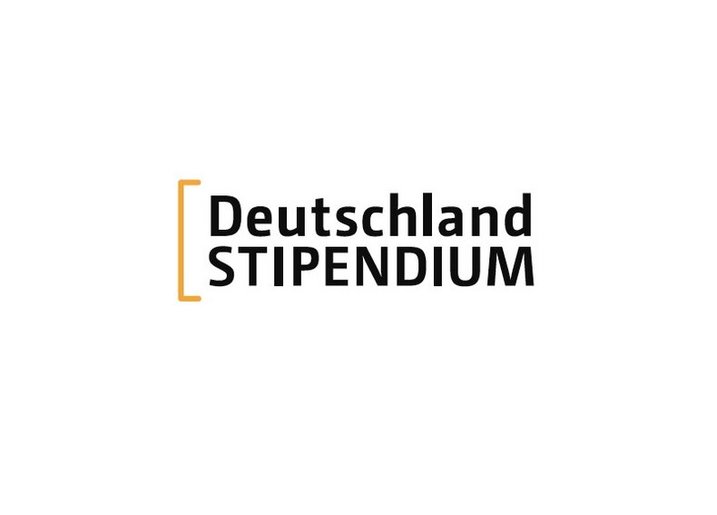Mainz University of Applied Sciences will receive around two million Euro in funding to further expand its research activities over the next five years as part of the Rhineland-Palatinate State Research Initiative. On Monday, May 6, 2024, Minister of Science ahd Health Clemens Hoch and University President Professor Susanne Weissman signed the respective target agreements for the Research Initiative 2024 to 2028. As part of the signing ceremony, researchers from Mainz University of Applied Sciences presented their research priorities in short keynote speeches.
“With its Research Initiative, the state government established a funding instrument 16 years ago that strengthens our universities in the competition for junior researchers, top researchers, and funding. Researchers at Mainz University of Applied Sciences are full of ideas, highly motivated, and successful. Under their leadership, the EMPOWER project funded by the Federal Ministry of Education and Science was successfully launched. This achievement will provide the participating universities with federal funding of around 13.3 million Euro between now and 2027,” says Science Minister Clemens Hoch. In addition to building a long-term profile in research, the state is also creating important underlying conditions for young researchers at its universities. This includes the establishment of the right to award doctorates. By 2028, around two million Euro in additional research funding will flow to Mainz University of Applied Sciences through the research initiative.
“The Research Initiative of the State of Rhineland-Palatinate is a great opportunity for Mainz University of Applied Sciences to expand its profile and areas of potential. The entire university benefits from the research initiative. Both established researchers and junior researchers receive support to submit their project ideas in highly competitive processes. At the same time, university teaching is closely linked to research, enabling our students to learn in a research-based setting. In our view, the research initiative is an important instrument for continuously honing our profile,” says Prof. Dr. Susanne Weissman, President of Mainz University of Applied Sciences.
Prof. Dr. Anett Mehler-Bicher, Vice President for Research and Transfer, adds: “The process of subjecting research activities to a review process every five years, which is initiated outside the university, is a helpful approach.”
The research initiative focuses on supporting selected research areas where the universities would like to intensify their research activities. The funding is intended, for example, to enable the research areas in their profile to continue to compete successfully for research funding both nationally and internationally. As part of the Research Initiative, the universities define their research profiles and potential areas. The research profile areas are a small number of established research areas associated with the university and its performance profile, which have already achieved outstanding results over a longer period of time. In the areas of potential, researchers generally work together on an interdisciplinary basis to develop new research topics.
Research profile areas and areas of potential of Mainz University of Applied Sciences
At Mainz University of Applied Sciences, four research profile areas and one area of potential are funded by the Research Initiative. Mainz University of Applied Sciences has honed its four profile areas and developed a new area of potential:
The research profile area Spatial Information and Surveying Technology includes 3D surveying technology and spatial information systems (GIS). These disciplines use technologies such as artificial intelligence (AI) and big data analytics. In 3D surveying technology, 3D point clouds are used to record the surface area of objects. Geodetic monitoring detects damage to bridge structures, for example, and ensures the sustainability of infrastructures.
The Sustainable Materials & Structures research profile area focuses on materials, construction materials, surfaces and water.
Renewable raw materials such as wood and wood substitutes are used economically and efficiently. The use of previously unused raw materials and the recycling of existing construction materials are also an important aspect. Composite materials and structures play a key role. In addition, precast concrete technology is being further developed with respect to the ecological transition. In the area of land and water, sustainable solutions for dealing with water and the consequences of climate change are in development.
Digitalization is leading to major changes in the scientific community, the economy, and our society. Artificial intelligence (AI) plays an important role here. New AI-based business models are emerging and the public sector is using digital technologies more efficiently. The transfer of knowledge is being accelerated, but professions and business models are also experiencing disruption. The aim of the Digital Innovation & Entrepreneurship research profile area is to conduct specific research projects with partners with the aim of developing application-oriented solutions to current issues in this area.
The research area Digital Cultural Heritage, Media & Design focuses on capturing, processing, visualizing, and communicating cultural heritage objects. Digital technologies and methods are employed to make these objects accessible to researchers and the general public.
The new potential area “Applied AI & Robotics” has synergies with the four profile areas
The use of applied artificial intelligence and robotics will radically and sustainably change our society in the coming years as part of the digital transformation. The interlinking of the analog and digital worlds and the automation and digital control of highly complex applications, in particular involving the use of AI-controlled software and robots, will also lead to a far-reaching paradigm shift in the world of research. The new potential area of Applied AI & Robotics pursues a comprehensive and interdisciplinary research approach with synergies across the four profile areas.
Rhineland-Palatinate Research Initiative
The Rhineland-Palatinate Research Initiative has been supporting and strengthening Rhineland-Palatinate’s state higher education institutions in the competition for junior researchers, top researchers, and funding since 2008. The funds from the Research Initiative are available to the universities beyond their basic funding to help them develop and expand their research profiles.




